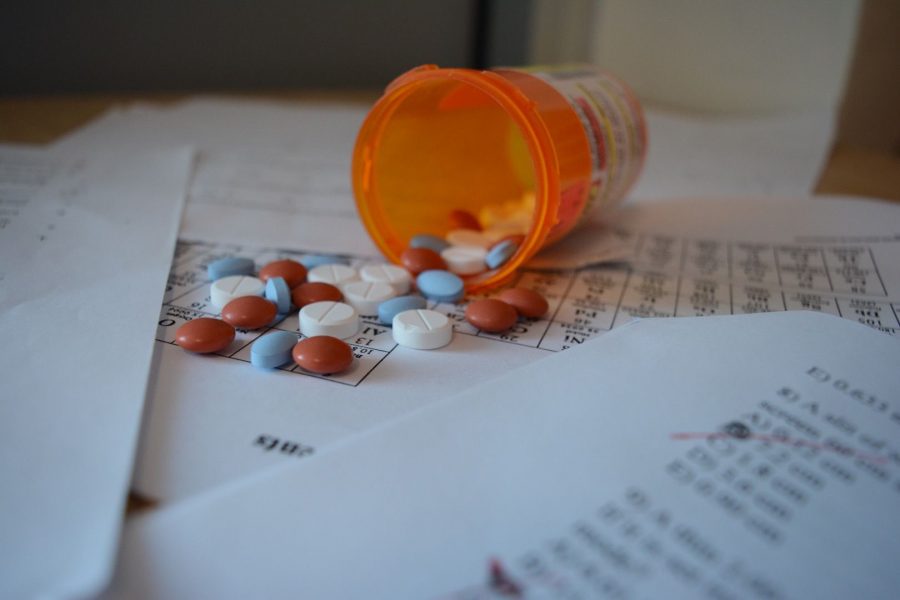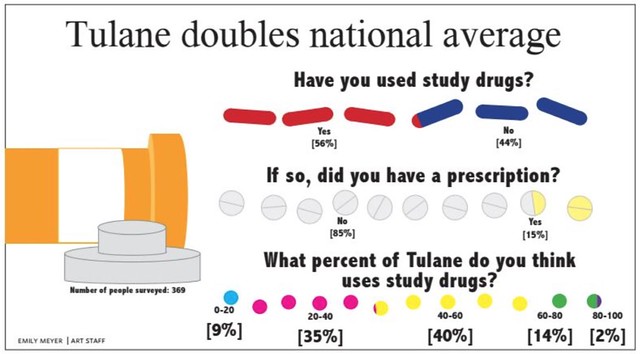Tulane students struggle with prevalence of “study drugs”
In recent years, the issue of abuse of prescription drugs as a form of study tool has swept college campuses nationwide. Tulane itself reflects these national trends.
Notebooks? Check. Highlighters? Check. Adderall?
For many students at Tulane, studying is about establishing a routine. This might include finding your favorite pen, grabbing a coffee from PJ’s or, as recent trends show, popping a pill.
Prescription drug stimulants used for the treatment of attention-deficit hyperactivity disorder, such as Vyvanse, Ritalin and Adderall, are a popular choice for college students looking to gain an edge in the classroom.
For one student, a junior in the School of Science and Engineering who has previously worked for The Hullabaloo, it’s hardly a choice. This student, who requested anonymity because she does not have a prescription, will be referred to as “Jessica.”
“I can’t get any work done if I don’t have Adderall,” Jessica said. “I can’t think, I can’t focus. I’m like half a person without the Adderall.”
On the other hand, students prescribed the drug require it medically as a stabilizing effect to an otherwise chaotic academic environment. In an independent survey conducted in April by The Tulane Hullabaloo, one anonymous respondent rebuked the term “study drugs.”
“People have no respect for the fact that ADD is a truly debilitating disorder and trivialize it by using study drugs,” the respondent said. “For me, my medications are not ‘study drugs,’ they are ‘function’ drugs.”
Though some students have prescriptions, the prevalence of the drugs across university campuses has led to an increase in “non-medical use,” or use without a prescription.
Of the 369 respondents, 204 admitted to having used these stimulants. Of those, only 57 had a prescription at the time of usage, while 147 students did so without.
The Center on Young Adult Health and Development obtained nationwide data showing the average non-medical prevalence among college students ranges from 13 to 21 percent, which is half that of The Hullabaloo’s findings.
Though there are likely multiple factors, senior Jared Raff believes the affluence of the school’s community is a major contributor.
“At Tulane, a lot of people here have the means to pay for these study drugs so if you were looking at a different scenario where it wasn’t a bunch of affluent kids who can pay for this medicine, would it be the same?” Raff said.
Pressures students face
Competition is a fundamental component to the college experience. It starts with the application process, in which an applicant is judged relative to their peers, and that mentality is only reinforced once they step foot on campus.
The “work hard, play hard” mindset extends from the classroom to social life. Tulane’s pervasive party scene, with no open-container laws and the raucous reputation of Mardi Gras, has created an anything-goes culture surrounding alcohol and drugs, which leaves little time for academics.
“In the environment that Tulane students are in, where people go rage all weekend then go to the library and do eight hours of work, it’s an environment conducive to taking intense study medication,” a senior in the school of liberal arts, who requested to remain anonymous to prevent legal implications, said. This senior will be referred to as “Michael.”
Director for Counseling and Psychological Services at Tulane, Dr. Donna Bender, recognizes how the competitive culture could play a role.
“Students may get the sense if they don’t attempt to enhance their performance in this way, they may not successfully compete with those who do,” Bender said.
Some students feel the pressure to contend stronger than others. Two anonymous respondents that took study drugs without a prescription praised them as “very helpful” and even “necessary.”
Not all students rely on study drugs. Sophomore Melanie Joseph has seen many of her friends take drugs such as Adderall but has never done so herself.
“Personally I feel that I’m capable of studying without them,” Joseph said. “Also, I just prefer to not have an altered state especially when I’m doing something as important as studying.”
Benefits versus consequences
Fears of these drugs are few and far between on college campuses, where they are so frequently offered and revered. But the Drug Enforcement Administration’s stance on these prescription drugs is anything but relaxed.
Adderall, and its similar variants, are categorized as Schedule II drugs for possessing, “a high potential for abuse, with use potentially leading to severe psychological or physical dependence.” Other drugs listed in the Schedule II classification are Vicodin, cocaine, methamphetamine, and Oxycontin.
According to Tulane’s Alcohol and Drug Policy, “students are prohibited from the unlawful manufacture, distribution, sale, possession, or use of controlled substances both on and off campus.”
The Tulane University Police Department’s Detective Sergeant Patrick Martin commented that its efforts focus mainly on education, mostly through orientations or other safety speeches.
Still, potential financial gains of dealing study drugs make it an enticing opportunity. Michael admitted to struggling with the morality versus money dilemma of selling prescription ADHD medicine.
“I have sold extra pills.” Michael said. “Honestly, there’s just too much of a market for it… The price ranges but during finals week one 40mg pill can go for as much as $15 dollars. I like to justify it to myself saying, I know what I’m doing is bad but I’m both making money and then also they’re not going to be able to study without it.”
Peer pressure to sustain a social reputation and exceed academically does nothing to alleviate the procrastination that forces students towards study drugs in the first place.
Jessica’s suitemate offered her Adderall the night before her first Economics test. In the name of time, she decided to try it.
“I remember taking it and thinking this was the best thing that ever happened to me,” Jessica said. “I was like…this is the key. And I didn’t realize that was my first red flag, that I should’ve stopped. But I got a 98 on that Econ exam…and I was like ‘this is it.'”
After taking just one pill, students feel elated and can study with ease. Suddenly, time concerns and academic pressure disappear, and many students find themselves returning to the drug again and again.
“…Someone gets accustomed to using it one time, and you begin to feel like you need to use it one time…a lot of times,” Michael said. “…It’s something that people don’t care about or think about while taking, they just think ‘I need to get this done.'”
And so Alice goes down the rabbit hole.
Prevalence at Tulane
On average, respondents thought that 42.9 percent of Tulane students use study drugs. The reality from The Hullabaloo’s independent study is over 10 percent higher.
The misuse of these drugs is not only widespread but at times severe. The line between keeping up and losing self-control begins to blur as competitive study habits cross the threshold into addiction.
“I remember every single week I wasn’t able to stop,” Jessica said. “[When] I didn’t have Adderall, the depression… I’ll tear up just thinking about it. It was awful.”
Nonetheless, Tulane students continue to use study drugs, particularly during finals. The prospect of a sparkling GPA outweighs the seemingly improbable negative effects that students like Jessica have experienced firsthand.
“Tulane as a school really encourages it,” Raff said. “Come here to party and work. Work hard, play hard.”
Your donation will support the student journalists of Tulane University. Your contribution will allow us to purchase equipment and cover our annual website hosting costs.




